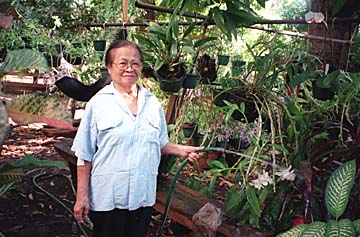

NEIGHBORHOODS

Wainee tenants
cherish old lifestyle
Sugar in west Maui is dying, and JMB/Amfac
By Gary T. Kubota
wants to shut down all its plantation homes,
but there is resistance
Star-BulletinLAHAINA -- Amy Ebanez enjoys watching her orchids bloom every spring at her sugar plantation village in west Maui, and is upset she may be forced to move.
"Before they do that, they have to find housing for us," said Ebanez, 75, the widow of a Pioneer Mill sugar laborer from the Philippines. "My late husband was promised he would have housing."
The International Longshore and Warehouse Union, representing Pioneer Mill employees, says it has been told by mill owner Amfac/JMB Hawaii that it plans to close the plantation camp at Wainee by the end of the harvest in October.
Last month, Amfac announced it is shutting down the plantation by the end of the harvest, laying off 76 full-time workers along with 50 to 70 people it employs intermittently.
The closure will affect 26 employees and retirees, ILWU negotiator William Kennison said. Including families, more than 100 people will be affected.
Kennison said Amfac has indicated that, as in some previous closings of plantation camps in Hawaii, it would be willing to give tenants $10,000 each for relocation.
Amfac/JMB Hawaii President Gary Grottke was unavailable for comment.
Maui Councilman Dennis Nakamura said he plans to talk with Amfac officials to explore the possibility of the residents staying in Wainee.
The sagging, weather-beaten houses at the camp -- many built 70 to 80 years ago -- are reminders of a time when sugar plantations provided low-rent homes as an incentive for immigrant laborers to move here.
Ebanez's husband Teopesto worked for the plantation from 1941 to 1973. He died a couple of years ago at age 88.
She remains at the house, paying Pioneer Mill $23 a month for rent and $1 for water. She pays for her own electricity and gas.
The camp is about a quarter-mile mauka of the mill, along dirt roads and among clusters of mango, coconut and banyan trees.
Several years ago, Amfac officials said they were willing to sell the houses to tenants on the condition the company would not have to improve them to meet county building codes.
Amfac made the commitment during a time when it was seeking land-use designations in the county Lahaina Community Plan.
County Council members passed the community plan in 1995 with the understanding residents would have an opportunity to buy their houses.
Amfac officials later proposed moving residents to future housing at Pukolii Village.
Neither the housing sale to Wainee residents nor the development of the Pukolii project occurred.
Kennison said when Amfac closes the mill, it plans to shut off sewer service to Wainee residents and the company is worried about the potential health hazard.
"The problem is the sewer system," Kennison said.
Kennison said he plans to ask the county if it is interested in taking over the camp.
He said tenants want to remain there, although many of the houses are in dilapidated condition.
The closure represents the end of an era for Lahaina, where Pioneer Mill has been among the oldest sugar plantations in Hawaii.
The plantation, which served as a foothold for many immigrant laborers, was formed in 1860. H. Hackfield & Co., the company that later became Amfac, bought the plantation in 1885.
Tourism is now the major industry in Lahaina, where street front businesses include art galleries, jewelry shops, and theme restaurants.
Foreign competition, driven by lower land and labor costs, has forced most Hawaii sugar plantations to close in the last 25 years.
Pioneer Mill expects to lose about $2 million in 1999.
Wainee tenants say they stand to lose not only a house, but also a lifestyle.
At the Wainee home of Paul "Uncle Moon" Keahi is an imu pit, where he helps to prepare Hawaiian food for relatives and friends who are holding a luau.
He grows taro and other plants to supplement food for his extended family, including several grandchildren who sometimes stay at his home.
Keahi, 63, who worked for the plantation for 47 years, said his family and most residents hope to find a way to maintain the camp in west Maui.
"It's like a little country right in Lahaina," said his wife, Primrose Keahi.